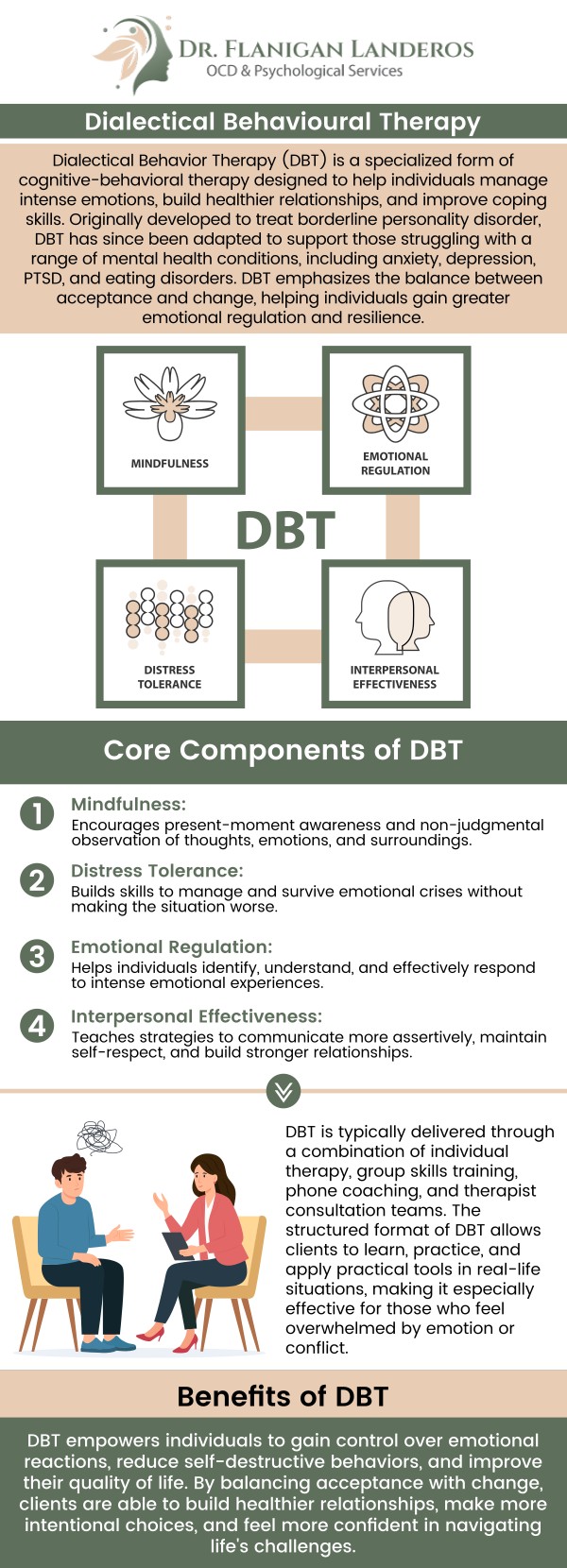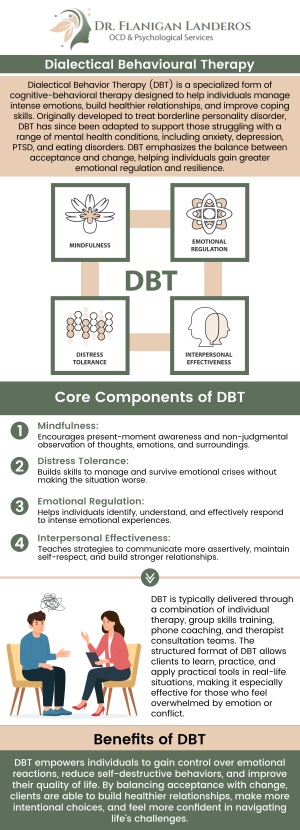Dialectical Behavior Therapy (DBT) Specialist Serving Santa Monica, El Segundo CA
Dr. Katie Flanigan-Landeros, Clinical Psychologist, offers Dialectical Behavior Therapy (DBT) to help individuals manage intense emotions and develop healthier coping mechanisms. It focuses on improving emotional regulation, mindfulness, and interpersonal effectiveness. DBT is particularly effective for conditions like borderline personality disorder, self-harm, and emotional dysregulation. For more information, contact us or schedule an appointment online. We are conveniently located at 400 Continental Blvd FL 6, Suite A El Segundo, CA 90245.




Table of Contents:
What is dialectical behavior therapy (DBT)?
What conditions can dialectical behavior therapy treat?
Who can benefit from dialectical behavior therapy?
How long does dialectical behavior therapy treatment usually last?
Dr. Katie Flanigan Landeros: Your Partner in Dialectical Behavior Therapy (DBT)
How Dr. Landeros Integrates DBT for Emotional Regulation
Dialectical behavior therapy (DBT) is a structured, skills-based approach designed to help individuals better manage emotional extremes and behavioral reactions that may otherwise feel out of control. It draws from both traditional cognitive behavioral therapy principles and mindfulness practices to help people become more aware of what they are experiencing without getting swept away by it. In practice, DBT tends to include both one-on-one sessions and skills training groups, so that patients not only explore their personal history and patterns but also build practical tools they can use in real-time. The overall structure of DBT is deliberate and intentional, often including elements like coaching between sessions and an emphasis on applying the skills learned outside the therapy room. DBT teaches how to make room for them while still maintaining a sense of direction and control. Emotional regulation, distress tolerance, interpersonal effectiveness, and mindfulness are each given dedicated focus. The goal is real transformation in how one relates to oneself, others, and the broader challenges of life. Individuals often begin to feel more grounded, capable, and steady. Over time, the process becomes less about managing crises and more about building a life that feels deliberate and aligned with personal values.
While DBT was originally developed for individuals who struggle with borderline personality disorder and chronic suicidality, the scope of its benefits has widened. It is now considered a strong option for those navigating patterns of self-harm, post-traumatic stress, depression, anxiety, disordered eating, or emotional reactivity that do not respond well to other treatment models. One of DBT’s core strengths is its ability to address emotional dysregulation, regardless of the diagnosis it stems from. This makes it particularly effective for individuals who feel overwhelmed by mood swings, impulsive behavior, or persistent emotional shutdowns.
Because DBT combines behavioral training with mindfulness and acceptance work, it can help address the kind of entrenched coping patterns that often form when someone has been living with untreated mental health concerns for a long time. The model also provides structure for individuals who have trouble following through with therapy goals in more open-ended or talk-focused approaches. At Dr. Katie Flanigan-Landeros OCD & Psychological Services, DBT care can be adapted to the specific presentation of each patient, whether that means managing social withdrawal, navigating conflict, or reducing the intensity of internal experiences that make daily life difficult to manage.
Individuals who have a hard time regulating their emotions, who experience intense or prolonged reactions to stress, or who struggle with impulsive behaviors often find DBT to be a good fit. This includes those who have a history of trauma or relational difficulties, as well as people who tend to either explode outward or shut down completely when faced with distress. DBT is also a promising option for those who have tried other forms of therapy in the past but found that insight alone did not shift how they felt or acted when overwhelmed. The structured, skill-based approach gives individuals something tangible to work on both in and outside of sessions. At Dr. Katie Flanigan-Landeros OCD & Psychological Services, DBT is one of several evidence-based models that may be incorporated into an integrative care plan, depending on the patient’s needs and therapy goals.
The length of time someone spends in DBT can vary depending on the severity of symptoms, consistency of attendance, and how quickly the skills begin to feel integrated. In many structured DBT programs, the full skills training curriculum is completed over several months, often broken into modules that cycle through twice for a deeper grasp. This timeline typically spans about six months to a year, although some individuals continue in individual therapy even after group work ends, particularly if they’re still building insight or addressing longstanding patterns. What tends to matter more than the number of sessions is how actively a person engages with the skills between appointments and whether the treatment is adapted to the individual rather than applied in a rigid or formulaic way. For some, progress may come quickly. For others, DBT is a longer-term process of unlearning survival responses and building a new framework for managing emotion. The clinicians at Dr. Katie Flanigan-Landeros OCD & Psychological Services take a flexible approach when it comes to treatment duration, making space for the unique pace of each patient and working collaboratively to reassess goals as therapy continues.
Dr. Katie Flanigan Landeros is a licensed clinical psychologist offering individual Dialectical Behavior Therapy (DBT) to adults in Santa Monica, El Segundo, and throughout California via telehealth. Her approach is particularly effective for individuals who experience intense emotions and struggle with emotional regulation, providing a balanced and compassionate path to healing and growth.
Dr. Katie Flanigan Landeros uses DBT as an evidence-based method to help you build a life worth living by fostering a balance between acceptance and change. She guides you in developing practical skills across four key areas:
Mindfulness: Learn to stay present and aware of the moment without judgment.
Distress Tolerance: Develop strategies to cope with and tolerate intense emotions without engaging in impulsive or destructive behaviors.
Emotion Regulation: Identify, understand, and change intense emotions that may be causing problems in your life.
Interpersonal Effectiveness: Learn to communicate assertively and maintain healthy, satisfying relationships.
Dr. Landeros tailors her DBT services to address the specific issues you face, such as those related to anxiety, OCD, or depression, empowering you to navigate life’s challenges with greater resilience and emotional strength.
Begin your journey toward emotional balance and lasting well-being. Dr. Katie Flanigan Landeros offers compassionate, evidence-based individual DBT to help you navigate intense emotions and build a life worth living. By developing practical skills in mindfulness, distress tolerance, and emotional regulation, you can move toward a more resilient and meaningful life. For more information, contact us or schedule an appointment online. We are conveniently located at 400 Continental Blvd FL 6, Suite A El Segundo, CA 90245. We serve patients from El Segundo CA, Santa Monica CA, Inglewood CA, Gardena CA, Torrance CA, Hawthorne CA, Culver City CA, Westmont CA, West Los Angeles CA and surrounding areas.

Check Out Our 5 Star Reviews


Additional Services You May Need
▸ Anxiety
▸ Depression
▸ OCD
▸ Relationships
▸ Individual Psychotherapy
▸ Psychological Testing
▸ ADHD
▸ Telehealth
▸ Seasonal Mood Changes
▸ Cognitive Behavioral Therapy
▸ Life Transition
▸ Acceptance and Commitment Therapy (ACT)
▸ Exposure With Response Prevention (ERP)
▸ Dialectical Behavior Therapy (DBT)
▸ OCD Subtypes
▸ Perfectionism
▸ Group Therapy

Additional Services You May Need
▸ Anxiety
▸ Depression
▸ OCD
▸ Relationships
▸ Individual Psychotherapy
▸ Psychological Testing
▸ ADHD
▸ Telehealth
▸ Seasonal Mood Changes
▸ Cognitive Behavioral Therapy
▸ Life Transition
▸ Acceptance and Commitment Therapy (ACT)
▸ Exposure With Response Prevention (ERP)
▸ Dialectical Behavior Therapy (DBT)
▸ OCD Subtypes
▸ Perfectionism
▸ Group Therapy


